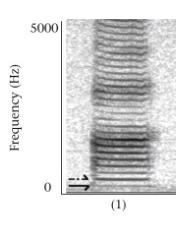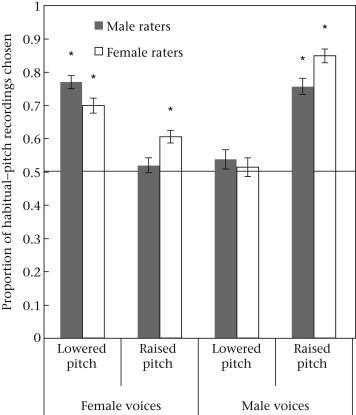 New research reveals that putting on an overly masculine or effeminate voice does not make you more attractive.
New research reveals that putting on an overly masculine or effeminate voice does not make you more attractive.
A while ago I wrote a post about sexual selection in humans, detailing how chest hair and waist-to-hip ratio appear to offer no functional benefits to people aside from making them attractive to the opposite sex. Some researchers concluded from this that individuals with these traits will have more reproductive success, spreading genes for these traits throughout the population despite the fact they conferred no survival benefit (i.e. being sexually selected). I cautioned against this conclusion, pointing out that nobody had identified whether people with attractive chest hair had more children, so we don’t know if it actually improves reproductive success.
The post itself was critically acclaimed, receiving the “editors selection” award from researchblogging.org and has consistently remained one of my most viewed articles, currently sitting in the #2 slot. However, most of these views don’t seem to be coming from people interested in the finer points of evolutionary theory. Rather they’re finding my article by googling phrases like “what is attractive to women”, “is chest hair attractive” and “is hair sexy.” In short, people are looking to exploit evolutionary psychology to get laid. Unfortunately my article didn’t give any advice in that department so they’re going to be sorely disappointed.
Those interested in such advice would have to turn to other sources such as the (in)famouse “pick-up artists” or PUAs. This subculture is based around pretending to be a woman’s ideal guy – typically a butch “alpha” male – in order to get her to have sex with you. This can range from fairly benign pieces of advice, such as “act confident”, to the downright misogyny of treating women as objects to be used for pleasure only (although it’s hard to see how something based upon, in essence, lying to women for sex could be anything but bad). Thus it should come as no surprise that PUAs frequently find themselves on the excellent manboobz site. Seriously, check that place out.

A less well known product of sexual selection
Anyhoo, these PUAs often justify their ideas with a bit of evolutionary psychology and on the surface isn’t their reasoning sound? Various exaggerated traits might indicate that a potential mate is a good choice (they are healthy, have good genes etc.) and so women who find extreme versions of those traits attractive will have more children, spreading a penchant for those traits throughout the population (and similarly driving the male population to become more extreme). The classic case is the peacocks tail. The guy with the biggest tail can survive with a massive handycap, clearly he is pure gold and worth mating with.
Surely, if someone was able to emulate those attractive traits then they too could draw the women to them. Except that if the trait can be copied by someone who is not healthy/doesn’t have good genes/etc. then finding that trait attractive wouldn’t result in women picking better mates, having more children and so on. The whole process would fall apart, which is why traits which are easy to fake are rarely exploited by sexual selection. The peacock can hardly fake his tail, after all, so it is a reliable indicator of mate worthyness.
So when a PUA tells you that lowering your voice (which isn’t that hard) is a sure fire way of making you seem more attractive you know something isn’t right. So don’t spend $37 on a guide on how to lower your voice just yet and read on. New research by an international team from Canada and Scotland have studied whether a male who artificially lowers their voice is indeed perceived as more attractive by women. Spoilers: the answer is no.

The frequency of a woman speaking in a deep voice
The researchers recorded the voices of 4 male and 4 female volunteers, asking each to make noises in their regular voice and also to try make noises higher and lower. The noises they had to make were vowel sounds, specifically “‘eh’ as in bet, ‘ee’ as in see, ‘ah’ as in father, ‘oh’ as in note and ‘oo’ as in boot.” When I first read “oo as in boot” one I thought it was a Canadian mis-writing the word “about.” They then analysed the pitch of the voice with scientific equipment to check that they were actually higher and lower. Because it’s just not science if you aren’t analysing something with electrical equipment.
After this needless analysis they presented the voices in pairs to >100 members of each gender asking them to pick the most attractive one of the pair. When the typical male voice was paired with a higher pitched voice, females picked the regular voice. However, when the regular voice was paired with the deeper voice they picked both about equally. In other words, putting on a deeper voice was no more attractive than the regular voice. For males rating female voices the results were about the same, albeit reversed. Regular voices were preferred to deep voices and higher pitched voices were no more attractive than regular voices.

The proportion of habitually pitched recordings picked over artificially lower/higher recordings
In short sex atypical voices were unattractive but super sex-typical voices were no more attractive than sex-typical voices. So artificially changing your voice is not going to lure the opposite sex to you (although having a naturally deeper/higher voice may). This is exactly what you’d expect given the principles of sexual selection: if a trait can be easily copied by everyone then it isn’t a good way to pick out good mates so won’t be viewed as especially attractive. There, evolution (and me) just saved you $37. Send me an email and we can discuss how you can repay me for this heroic public service.
Fraccaro, P., O’Connor, J., Re, D., Jones, B., DeBruine, L., & Feinberg, D. (2012). Faking it: deliberately altered voice pitch and vocal attractiveness Animal Behaviour DOI: 10.1016/j.anbehav.2012.10.016

